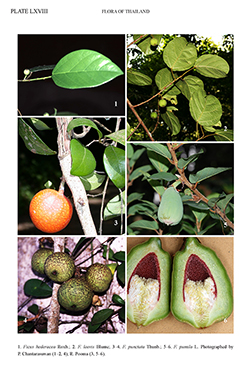e-Flora of Thailand
Volume 10 > Part 4 > Year 2011 > Page 588 > Moraceae > Ficus
SOE9. Ficus punctata Thunb.wfo-0000689925
Ficus: 9 1786; Miq., Ann. Mus. Bot. Lugd. Bat. 3: 268, 289. 1867; King, Ficus 2: 68, t. 88, 89. 1888; Ridl., Fl. Malay Penins. 3: 338. 1924; Gagnep., Fl. Indo Chine 5: 813. 1928; Corner, Gard. Bull. Singapore 10: 137, t. 8, 22–25, 33. 1939; Kochummen, Tree Fl. Malaya 3: 154. 1978; Kochummen, Tree Fl. Sabah & Sarawak 3: 244. 2000; C.C.Berg & Corner, Fl. Males., Ser. 1, Spermat. 17(2): 506. 2005. Plate LXVIII: 3–4.
Accepted Name : This is currently accepted.
Synonyms & Citations :
Description : Root-climber. Branchlets drying brown (to blackish). Leafy twigs 1–3 mm thick, solid, sparsely to rather densely minutely whitish to brownish puberulous or subtomentose. Leaves distichous; oblong, elliptic, subobovate, obovate or falcate (to lanceolate or suborbicular), (0.5–) 1–9(–12) by (0.2–)0.5–5.5(–7.5) cm, ± asymmetrical or symmetrical, coriaceous, apex rounded to obtuse or shortly and bluntly acuminate, minutely retuse, initially with hairs in the notch, base inequilateral to equilateral, if inequilateral, then the broad side rounded to subauriculate, the narrow side obtuse to cuneate, if equilateral, then both sides (sub)cuneate, margin entire, ± revolute (at least towards the base); upper surface glabrous, lower surface sparsely puberulous to substrigillose or glabrous on the main veins, sparsely minutely puberulous on the rims of the (small) areoles; cystoliths only below; midrib (almost) flush to slightly prominent (or slightly impressed), lateral veins 3–6 pairs, the basal pair to ca ⅙–⅓ the length of the lamina, unbranched, other lateral veins often forked away from the margin, tertiary venation reticulate, the smaller veins (almost) flush beneath, the areoles foveolate; waxy gland 1, in the axil of the basal lateral vein at the broad side of inequilateral laminas, or 2, in the axils of both basal lateral veins of equilateral laminas, or absent; petiole (0.1–)0.5–1.5(–2) cm long, puberulous, the epidermis flaking off; stipules 0.2–1.5 cm long, minutely appressed-puberulous, subpersistent or caducous. Figs ramiflorous to cauliflorous on leafless branchlets to 10 cm long with short internodes, solitary, sessile or with a peduncle to 2 cm long; basal bracts 2–5 mm long, persistent; receptacle subglobose, pyriform or ellipsoid, ca (1.5–)3–5(–10) cm diam. when dry, if pyriform to ellipsoid, then to 8 cm long, when fresh 4–8(–15) cm diam., 0.4–1.5(–2.5) cm long stipitate, brown puberulous (at least on the lower part of the receptacle and on the stipe) to velutinous or sparsely (whitish) puberulous to subglabrous, yellowish, orange, pinkish, scarlet or black at maturity, apex ± umbonate, ostiole ca 3–5 mm diam., prominent to flat, often surrounded by 3–5 stiff bracts pointing upwards; internal hairs abundant. Tepals red. Stamen 1.
Thailand : SOUTH-WESTERN: Phetchaburi; CENTRAL: Nakhon Nayok; SOUTH EASTERN: Chon Buri, Rayong, Trat; PENINSULAR: Surat Thani, Phangnga, Nakhon Si Thammarat, Phatthalung, Trang, Satun, Songkhla, Narathiwat.
Distribution : India (Nicobar Islands), Burma, Vietnam, Cambodia, Taiwan, Peninsular and Bornean Malaysia, Singapore, Brunei, Indonesia (Sumatra, Java – type, Kalimantan, Sulawesi, Lesser Sunda Islands, Moluccas), the Philippines.
Ecology : Evergreen and dry evergreen forests, to 750 m alt.
Vernacular : Duea thao bai yai (เดื่อเถาใบใหญ่)(Narathiwat).

